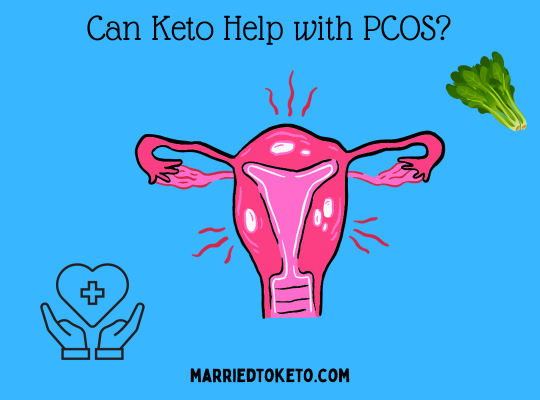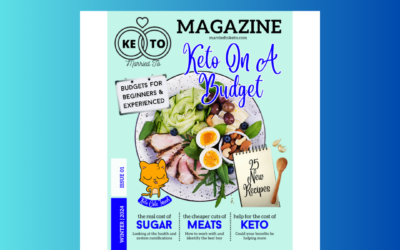PCOS stands for polycystic ovary syndrome. It happens when cysts develop along the outer edge of a woman’s ovaries. It is physically painful. PCOS is also mentally painful, as women often have a hard time getting pregnant. So what does this have to do with keto? Some studies show that keto and PCOS can be connected – in a good way!
Symptoms and Causes of PCOS
Doctors diagnose you with PCOS if you have two of the following symptoms:
- Irregular periods
- Too much of the hormone androgen
- Polycystic ovaries (ovaries have cysts, they are bigger than normal, or the don’t work as they should).
The causes of PCOS are really unknown, but there are some risk factors. One we have no control over – our genes. If your family has a history of PCOS, you are more likely to suffer from it. The second factor is insulin resistance, which can lead to obesity and cause your body to make more androgen. The third factor is long-term, low-grade inflammation. Inflammation is often linked to insulin resistance and obesity. If you’ve read our blogs, you can see how keto might help the above risk factors.
Inflammation with Keto and PCOS
Let’s break down some of these risk factors. Firstly, inflammation. Bill wrote a blog about keto and inflammation. Many of the foods we eat on a standard American (and Canadian) diet contain inflammatory agents. Things like sugar, processed grains, hydrogenated oils and other processed foods increase inflammation. These are all things we do not eat on keto. Additionally, we eat foods that help with inflammation on keto, such as eggs, natural oils, and fatty fish. Red meat is the one thing we do eat that can lead to inflammation, but if this is an issue, you can easily do keto without red meat.
The Role of Insulin Resistance
The entire reason we started keto was the fact that it keeps blood sugar levels stable. We don’t take in sugar. Our bodies don’t have to produce insulin to break down the glucose from carbohydrates to create energy. Insulin resistance is when your body doesn’t react well to insulin, so if you eliminate the insulin, you eliminate the problem. By using ketones for energy, we go around the problem of how your body reacts to insulin and breaks down glucose.

When your body is having a hard time with insulin, it can cause your ovaries to produce more of the hormone androgen. Androgen is usually a hormone that is higher in men. It produces hair growth in areas women tend not to want hair – such as the face, chin and stomach. It can also lead to problems with acne. More importantly, it can lead to infrequent periods which obviously affects your ability to get pregnant.
Obesity with Keto and PCOS
Well, this one is pretty obvious. PCOS is more severe in people who are obese. According to the Mayo Clinic article, one way you can reduce the symptoms is by losing weight. That is something keto can definitely help with! After being on keto for just 6 months, I lost 65 pounds. Although we turned to keto for health reasons related to insulin, we enjoyed the benefits of weight loss too.
A Final Thought About Keto and PCOS
I knew a woman who had PCOS and her life was so hellish every time she started her period. It completely interrupted her life because she just couldn’t get out of bed. She had to call in sick and this led to ongoing absenteeism, which affected her work life. She got married, and she wanted to start a family and the process was agonizingly slow for her. I’m happy to report that she does now have a daughter!
I was very fortunate to not have the issue of PCOS, but I did have fibroids in my uterus, which was also painful and interrupted my cycles. Eventually I had a hysterectomy, but I was older and already had my family. What would have happened with my fibroids if I had been on keto? I see another blog in my future!
The bottom line is that PCOS is no joke. It is painful and can keep you from starting a family. Some doctors do prescribe keto as a partial treatment for PCOS, and I don’t see how it could hurt. But, sometimes the idea of starting a new way of eating on top of physical and mental pain could be just too much. I hope that our blogs, our website, and our workbook can help women who want relief from that pain attempt the keto diet. It’s a lot to start, but it is so worth it when you get the hang of it!
Wendy





